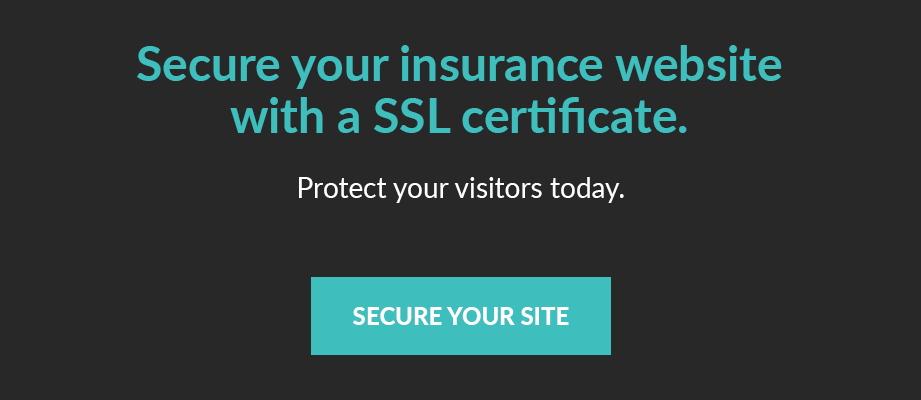Is your insurance website secure?
Protecting your website visitors is a must. Protecting personal data is a big concern for your existing and potential clients.
64% of US adults have noticed or been notified of a data theft breach of their own personal sensitive information. And roughly half of Americans feel that their personal information is less secure than it was five years ago.
When you are trying to instill trust in your clients and build a business where you’re seen as a trusted advisor, the last thing you want to do is put your website visitors at risk.
Securing your site with SSL is an easy way to protect your web visitors. And as an added bonus, it could even have a positive impact on your website traffic.
What is SSL?
Have you ever noticed that some websites begin with “http://” and others begin with “https:”?
That extra “s” indicates your connection to that website is secure.
The technology that makes a site secure is called Secure Sockets Layer. You can call it SSL.
How Does SSL Work?
SSL establishes an encrypted link that ensures that all data passed between the web server and browser remains private.
Let’s say you have a form on your insurance website that visitors can use to get a quote or a method for accepting payments online. Online visitors simply fill in their information and hit ‘submit.’
On an unsecure website, that information is transmitted in plain text, leaving visitors vulnerable to a “man-in-the-middle” attack where a hacker can see and intercept the data.
SSL prevents these hacks by creating a secure connection. Then data is encrypted, transmitted, and decrypted instantaneously. Even if a hacker was able to intercept the data in the middle, they wouldn’t have the “key” to decrypt it.
Signs of a Secure Site
When a site has been secured with SSL, there are tell-tale signs that help website visitors know.
As mentioned above, the first indication of a site secured with SSL is the added ‘s’ in “https:”
But that’s not all.
Website browsers will also indicate if a site is secure with visual icons, such as a green padlock on the left or right side of the URL bar.
If your site isn’t secure, visitors could see a big red “not secure” warning indicating that the site may be vulnerable to attacks.
SSL matters to consumers: Recent research revealed that 85% of U.S. consumers surveyed said they would leave a site that is not secure.
The SEO Benefits of SSL
Aside from the obvious benefits of securing your site with SSL such as protecting the security of your website visitors, there’s another reason to consider SSL:
Google recommends, and to a certain degree rewards, secure sites.
“We encourage you to adopt HTTPS in order to protect your users' connections to your website, regardless of the content on the site.” - Google
In 2014, Google announced they would be adding HTTPS as a ranking signal in their search algorithm.
While Google has said that HTTPS is a small ranking signal that carries less weight than other signals such as high-quality content, it could be the tie breaker that gives your site the edge over a non-secure competitor’s site in the search engine results.
An analysis of over 1 million search results found that HTTPS correlated with higher rankings on Google’s first page.
In the future, Google may decide to boost the rewards for sites that are secure with SSL. What equals a small SEO edge today could become a major SEO boost tomorrow.
SSL is a Smart Choice
To summarize, securing your insurance website with SSL brings numerous benefits:
- Protect data submitted by website visitors
- Project signs of trustworthiness
- Adhere to Google’s recommended security guidelines
- SEO benefits that are minor today (but could be major tomorrow)
Adding a SSL certificate to your insurance website is a small investment with long-lasting returns.
